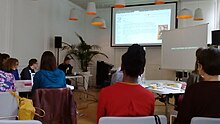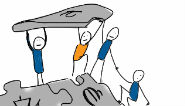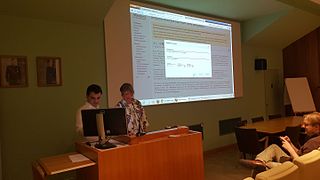Newsletter/2016-09 news/long
Wikimedia Belgium Newsletter - September 2016
Please find the newsletter of September 2016 from Wikimedia Belgium below.
The newsletter covers the period of April to August 2016.
Rue du Trône 51
1050 Brussels
info@wikimedia.be
www.wikimedia.be
be.wikimedia.org
https://twitter.com/Wikimedia_BE
Upcoming events
edit
- 1-30 September 2016: photo contest Wiki Loves Monuments, which has as goal to describe and depict the cultural heritage better on Wikipedia. You are welcome to take photos of monuments from everywhere in Belgium and Luxembourg and upload them for use in Wikipedia. Read more >>>
During the month of the photo contest multiple photo tours are organised on location where you can participate. These tours are on:- 10 September: Ghent
- 11 September: Mechelen
- 16 September: Antwerp
- 21 September: Liège
- 16-18 September 2016: WikiCon 2016 in Stuttgart, conference for the German speaking community on Wikipedia and her sister projects.
- November 2016: prize giving ceremony for Wiki Loves Art and Wiki Loves Monuments. Exact date to be pricked.
- 19 November 2016: Wikimedia Conference Netherlands in Utrecht, conference for the Dutch speaking community on Wikipedia and her sister projects.
Short news
edit- Two editing Wikipedia workshops have been given to employees of telecom provider Proximus. Other organisations who like to follow a workshop editing Wikipedia can invite us to give one.
- On 18 June the 15th anniversary of the Dutch Wikipedia was celebrated in the Netherlands Open Air Museum in Arnhem. There the Dutch community came together, followed a guided tour, had a dinner, and much time to talk with the other volunteers on Wikipedia.
- From 22 to 26 June the 12th edition of Wikimania, the annual conference of the Wikimedia movement, took place in the Italian mountain village Esino Lario, north of Milan.
- At the end of June an international conference took place in Amsterdam for cultural institutions with as subject the digitalisation of cultural heritage. There we were present, together with Wikimedia Nederland, to explain how Wikipedia and Wikimedia can play a role in this. With the start of the conference the Dutch minister for education, culture and science, Jet Bussemaker, opened the Wikipedia writing weeks about cultural heritage.
- From 19 to 21 August in Paris the first WikiConvention for the French community was organised. Wikimedia Belgium gave two presentations. One about the under-representation of female users on Wikipedia, called the gender gap (article about the gendergap). The second was about the introduction of Freedom of Panorama in Belgium (see below).
- During 100 days, 100 masterpieces from museums in Brussels were brought to the attention of the Belgian public. This is the project of the 100 masters that in the period 18 May to 27 August was organised by the Brussels Museums Council. Before the 100 days started, not all participating museums had an article on Wikipedia, but now all 44 museums have an article in both the French and Dutch language Wikipedia.
Association
edit
Following a formal complaint from the Wikimedia Foundation about our treasurer, on 6 July a special general assembly was held to discuss the serious situation. With all alleged facts taking into account, the General Assembly decided to dismiss the specific board member (report). Also an internal audit has been executed to identify and resolve deficiencies in our administration.
The 2015 annual report of Wikimedia Belgium is now available. It consists of an activity report and a financial report. These reports can be found at:
Education
edit
For several years a Wikipedia class is organized in Kortrijk, where students write articles on Wikipedia. Also in the autumn of 2016 a new Wikipedia class is launched.
For his work "Political and social history" teacher Benedict Wydooghe (VIVES-Kortrijk) uses for several years a so-called Wikipedia class. Students get instructed to seek information and knowledge to share and discuss and contribute in the form of corrections, additions and their own (thematic) article. In 2014 Wydooghe worked around the theme of the First World War, in 2015 around the theme French Revolution, the Enlightenment and the commemoration of the Battle of Waterloo. In 2016, students choose: either they write an article in the margins of 500 years of Utopia and Thomas More, or dig in the history of social work in Flanders. Teachers who want to be inspired, can take a look at Wikipedia class (in Dutch). There you find a roadmap (if you want to start), there is an overview of the learning goals, there are examples of 'finished' assignments and course materials for courses such as "Writing Training", "Audiovisual Communication" and "Cybercrime".


Brussels writing weeks
editAfter some actions of hate in Brussels in March, in April it was back time for love, love for the city of Brussels. From 4 to 17 April we organised in Brussels and on Wikipedia the Brussels writing weeks. We called existing and new users to write about the Brussels Capital Region to get this region better described on Wikipedia. We also organised 11 writing sessions on location in the City of Brussels, Anderlecht, Ixelles, Jette, Koekelsberg and Woluwe-Saint-Pierre. Interested people could go there to work under the guidance on Wikipedia articles and where they could ask questions to experienced Wikipedia volunteers. Prior to the writing weeks we gave three courses to library staff in Brussels and for the student group InfoGroup of the Vrije Universiteit Brussel. Also, we were extensively supported by the Flemish Community Commission. All thanks for the support and use of your facilities!
The writing weeks have been a success and led to a lot of media attention. 14 news organizations have posted a message about it on their channel (newspaper/radio/TV), and we had several reporters and camera crews passing by.
Although this year the focus of the writing weeks was mainly on writing in Dutch, in various language versions of Wikipedia articles have been written about the Brussels region and the city of Brussels. In addition to Dutch, articles have been written in English, French, German, Czech, Greek, Hungarian, Indonesian, Italian, Romanian, Russian, Slovak, and Spanish. In total more than 400 articles have been written by more than 100 participants. In addition about 50 articles have been improved significantly and some images of Brussels have been uploaded.
In conclusion, there were two moments organized where participants were thanked by Rudi Vervoort (Minister-President of the Brussels Capital Region) and Sven Gatz (Flemish Minister for Culture and Brussels Affairs).
In the spring of 2017 we plan to organize new Brussels writing weeks. We also expect to organize writing weeks with as theme Flemish Brabant and Walloon Brabant.
Wiki Loves Art
edit

After more than a year of preparations, in July and August we organised the photo contest Wiki Loves Art, where we asked photographers and art lovers to take photos in the participating museums. Throughout Belgium, in these two months 13 museums and libraries opened their doors to get in this way better described and visible on Wikipedia and to make their managed heritage more accessible to the global audience.
The project has been organised by Wikimedia Belgium, Packed vzw, Faro, Open Knowledge Belgium and Creative Commons Belgium. In preparation of the contest, we published in April a one pager with explanations (invitation), and in June we organized an explanation session in an afternoon for interested institutions.
Eventually 13 institutions opened their doors to the volunteer photographers to bring their museum/library and collection on Wikipedia better in the picture and to get it better described. At least 11 articles have been written and 3 been extended during the two writing sessions at the PhotoMuseum of Antwerp and the Royal Library of Belgium. In total more than 3,000 photos have been uploaded of the exhibited works and objects, the buildings of the institutions and the events. The participating institutions (with photo category) were
- Ceramic Museum in Andenne (photos)
- FOMU Photo Museum in Antwerp (photos)
- Hendrik Conscience Heritage Library in Antwerp (photos)
- Halle Gate in Brussels (photos)
- Cinquantenaire Museum in Brussels (photos)
- Royal Library of Belgium in Brussels (photos)
- Royal Museum of the Armed Forces and of Military History (photos)
- Museum of Fine Arts in Gent (photos)
- Bardelaere Museum in Lembeke (photos)
- Library of Université de Liège (photos)
- Kazerne Dossin – Memorial in Mechelen (photos)
- Mundaneum in Mons/Bergen (photos)
- Musée Royal de Mariemont in Morlanwelz (photos)
In September-October a jury will select the winners from these thousands of photos. In the end of November a prize ceremony will take place.
See also the websites of Wiki Loves Art op: http://www.wiki-loves-art.be and Wiki Loves Art.
-
in the Ceramic Museum in Andenne
-
in the FOMU Photo Museum in Antwerp
-
in the Hendrik Conscience Heritage Library in Antwerp
-
in the Halle Gate in Brussels
-
in the Cinquantenaire Museum in Brussels
-
in the Royal Library of Belgium in Brussels
-
in the Royal Museum of the Armed Forces and of Military History
-
in the Museum of Fine Arts in Gent
-
in the Bardelaere Museum in Lembeke
-
in the Library of Université de Liège
-
in Kazerne Dossin – Memorial in Mechelen
-
in the Mundaneum in Mons/Bergen
-
in the Musée Royal de Mariemont in Morlanwelz
Wiki Loves Monuments
edit
In September it is traditionally time for the photo contest around monuments in Belgium and Luxembourg. Since 2011 we hold this competition annually to get the cultural heritage of Belgium and Luxembourg better described and depicted on Wikipedia. Also in this edition, anyone can participate by example in his or her area by taking photos of monuments.
This year we especially like to draw attention to those monuments that have not yet been with a photo on Wikipedia. In the tables on Wikipedia quite a few monuments have already a photograph, but many not yet. Help to get these monuments on Wikipedia: take photos and upload them!
To get not photographed monuments more on Wikipedia, we organize four photo tours:
- 10 September: Ghent
- 11 September: Mechelen
- 16 September: Antwerp
- 21 September: Liège
For more information about participation and how you can register visit: Photo tours September 2016.
On our website more information can be found how to upload photos: www.wikilovesmonuments.be
You can also upload photos easily with already pre-filled information by clicking in the last column of the monument lists on the French/Dutch Wikipedia on Upload photo.
|
| ||||||||||||||
|
|
| |||||||||||||
|
|||||||||||||||
Other
editFreedom of Panorama in Belgium
edit |
| The Atomium before 15 July 2016 |
 |
| The Atomium since 15 July 2016 |
After many years of problems and asking attention for this problem for more than a year, Belgium got Freedom of Panorama in 15 July 2016. Freedom of Panorama means that you are free to publish photos of buildings and artworks in the public space, whose author is not deceased 70 or more years ago. For Wikipedia is not having a Freedom of Panorama a problem, because this results in that we can't illustrate articles about recent artworks and buildings with a photo.
In June-July 2015 we created awareness throughout Europe about the problem of a missing Freedom of Panorama, just before the European Parliament was going to adopt a proposal that could lead to the abolition of Freedom of Panorama throughout Europe (more information). Thanks to our action, that motion was rejected.
In May 2016 a proposal was submitted by Patricia Ceysens, member of the federal parliament for Open VLD, to implement Freedom of Panorama in Belgium. On 16 June this proposal was adopted by the federal parliament and on 15 July the law took into effect.
To celebrate the implementation we organised on that day a launch event with reception at the Royal Institute for Cultural Heritage. There the symbolic first photo was added to a Wikipedia article by Patricia Ceysens.
As a result of the introduction of Freedom of Panorama in Belgium more than 1,700 photographs of buildings and artworks were restored on Wikimedia Commons. See for an overview at: overview restored photos.
-
Patricia Ceysens adds
-
symbolical first photo
Just For The Record
edit
Just For The Record is a project addressing how gender is represented in new media and writing/publishing tools like Wikipedia, and what influence this has on the way history is recorded. To address gender issues Just for the record organised again two events in Brussels.
During these events, observations were taken as the point of departure for lectures and discussions, followed by an intervention: a crash course in Wikipedia editing to improve gender neutrality on Wikipedia.
On 10 June and 18 June two sessions were organised by the team of Just For The Record. The sessions included presentations and a workshop editing Wikipedia. Both sessions took place in the Muntpunt (nl) in Brussels and had as theme Bots, robots, cyborgs.
Links:
- Just For The Record website
- Projectpagina on the English Wikipedia
- Just For The Record in the previous newsletter
Input requested
edit
Wikimedia Belgium is a non-profit organisation and we depend on donations and grants to carry out our activities and projects. Our largest grant provider is the Wikimedia Foundation. The Foundation requires us to report annually on our activities, but also that we have a good plan to encourage free knowledge (and more) in Belgium.
Therefore it is time in the month September to think about what Wikimedia Belgium should do in 2017. Do you have ideas or wishes in the area of free knowledge, Wikipedia, Wikimedia, education, etc ... Let us know!
- What would you like to do yourself in 2017?
- What subjects should Wikimedia Belgium focus on in 2017?
Let us know your thoughts before the end of September at strategic plan 2017.
Thanks for the ideas!

















